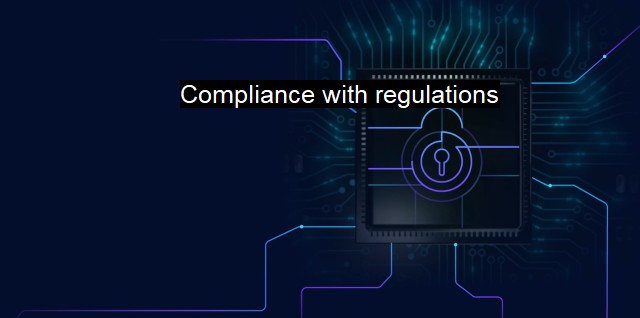What are Compliance with regulations?
The Importance of Compliance with Cybersecurity Regulations and the Role of Antivirus Software in Protection of Digital Assets and Information
Compliance with regulations in the context of cybersecurity and antivirus refers to adhering to a set of guidelines or rules designed to protect the integrity, confidentiality, and accessibility of data or information. These regulations, often instituted by governments, businesses, or organizations, are aimed at mitigating risks associated with data breaches, cyber-attacks, and other cyber threats that could compromise privacy, security, and operations.Cybersecurity is a critical concern in today’s highly interconnected digital world. The number of cyber threats and cyber-attacks have greatly increased over the years, necessitating a proactive and robust approach to ensuring the security of mission-critical networks and sensitive data. As such, numerous regulatory frameworks and standards have been put in place to prescribe security measures that organizations and individuals must follow to effectively counter these threats.
Complying with cybersecurity regulations involves implementing required security controls and measures, periodic auditing, timely reporting, and effectively responding to security incidents as stipulated by relevant regulatory bodies. Security controls may include but are not limited to, access control techniques, encryption, firewalls, secure network design, vulnerability scanning, and penetration testing. On a broader scale, compliance includes establishing policies and procedures, conducting training and awareness programs on cybersecurity, creating continuity and disaster recovery plans, and instituting incident response mechanisms.
Many regulatory jurisdictions encourage or mandate organizations to adopt antivirus solutions to safeguard their digital infrastructure. Key functionalities of antivirus software are the prevention, detection, and removal of malware, including viruses, worms, and trojans. Implementing reliable antivirus programs is an essential compliance requirement as it forms the first line of defense against malware, which is a prime component in most cyber threats, including data breaches.
Regulations such as the General Data Protection Regulation (GDPR) in the European Union, Health Insurance Portability and Accountability Act (HIPAA) in the US, California's Consumer Privacy Act (CCPA), and Australia's Privacy Amendment (Notifiable Data Breaches), among others, require companies to adopt cybersecurity best practices, including use of antivirus software, to protect customer and patient data.
Compliance with these regulations encompasses both technical and administrative aspects. The technical component might include ensuring all systems receive regular security updates, implementing robust access controls, installing antivirus software, and regular monitoring of networks for signs of intrusion. The administrative part might involve training staff about cyber risks, reporting breaches within specified periods, and having policies for things like data loss prevention.
Non-compliance to these regulations can result in penalties such as fines, legal repercussions and reputational damage. For instance, under GDPR, companies can face fines of up to 4% of annual global turnover or €20 million, whichever is greater, for non-compliance. Beyond potential fines, non-compliance can also lead to a loss of trust among customers and stakeholders, further affecting the reputation and long-term viability of a business.
Compliance with cybersecurity and antivirus regulations entails a systematic approach to managing vast arrays of cyber risks that confront organizations. In a data-driven world ridden with relentless cyber threats, compliance with relevant regulations is no longer a choice but a necessity for organizations to safeguard their digital assets, operations, and overall reputation. Compliance ensures a safer digital space for business execution and consumer engagement. NEGLECTING regulatory compliance compromises, not merely the business operation but the entire digital security fabric.

Compliance with regulations FAQs
What are the regulations regarding cybersecurity compliance?
There are various regulations that organizations need to comply with to ensure cybersecurity compliance. Some of the most common ones include the General Data Protection Regulation (GDPR), the Health Insurance Portability and Accountability Act (HIPAA), and the Payment Card Industry Data Security Standard (PCI DSS).What is antivirus compliance?
Antivirus compliance refers to the process of ensuring that antivirus software on a computer or network is up to date and functioning properly. This involves deploying antivirus software, configuring it correctly, and regularly updating it to protect against the latest threats.Why is compliance important in cybersecurity?
Compliance is important in cybersecurity because it helps organizations ensure that they are following best practices and industry standards for protecting sensitive information. Failure to comply with regulations can result in fines, legal liability, and damage to an organization's reputation.How can organizations ensure compliance with cybersecurity regulations?
Organizations can ensure compliance with cybersecurity regulations by implementing a comprehensive cybersecurity program that includes policies, procedures, and controls. They should also conduct regular risk assessments, train employees on cybersecurity best practices, and conduct audits to ensure compliance. It's also essential to work with trusted vendors and partners who can provide additional cybersecurity support.| | A | | | B | | | C | | | D | | | E | | | F | | | G | | | H | | | I | | | J | | | K | | | L | | | M | |
| | N | | | O | | | P | | | Q | | | R | | | S | | | T | | | U | | | V | | | W | | | X | | | Y | | | Z | |
| | 1 | | | 2 | | | 3 | | | 4 | | | 7 | | | 8 | | |||||||